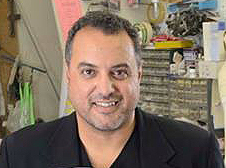

The last of three blogs on The Solve ME/CFS Initiative focuses on the SMCI’s core mission – funding research that makes a difference in chronic fatigue syndrome (ME/CFS).
Serendipity can play a major role in research and it may be doing so at the SMCI. Carol Head felt she got the complete package with Nahle: his strong research background and administrative and communication skills appear to have gotten him the job. Nahle has what appears to be an ideal resume for someone tasked with overseeing a research effort at a non-profit like the SMCI.
Whether Carol took it into account or not, Nahle’s specific research focus also makes him potentially a key asset. If energy production really is the problem in ME/CFS, then Nahle is well poised to research and understand it. Nahle’s past diabetes research actually focused on some of the same energetic issues (pyruvate dehydrogenase) that studies suggest are facing ME/CFS.
Nahle has taken the SMCI’s creative but slower moving research program and put it on steroids. Now instead of funding several larger projects every three or four years, the SMCI is funding four or five smaller projects and several research “initiatives” every year. The projects are smaller (10-20 people) and thus will provide less data, but they give Nahle the opportunity to chase or focus on rapidly emerging leads that show up in ME/CFS research.
The 2016 awards demonstrated a real nimbleness in doing that. Note a strong theme that emerges: determining how energy production problems are bollixing up the immune system in ME/CFS. Time will tell if Nahle has taken the right focus, but for now he appears to have made some timely funding choices.
The 2016 Melvin Ramsay Awards
Your Brain on Fire?

Jarred Younger hopes to learn if inflammation in ME/CFS patients brains is making them a bit hotter than normal
How can you not love, for instance, Nahle’s choice to fund Jarred Younger’s effort to use magnetic resonance spectroscopy – a tool we are seeing almost everywhere in ME/CFS – that’s been tweaked to add on a thermal element called thermometry (MRSt) Younger will use his MRSt machine to determine if neuroinflammation is present in ME/CFS patients’ brains, and if it is, where it is and how much of it is there.
Neuroinflammation, of course, has been of extreme interest in ME/CFS since a Japanese paper came out a couple of years ago showing it was present .Younger’s project – which is unique in that it uses a non-invasive technique (no radiation or dyes needed) – to assess the amount of neuroinflammation by measuring the temperature of the brain – was just crying out to be funded. Kudos to the SMCI for doing that.
As a bonus the project will collect data on several putative markers of neuroinflammation, including myo-inositol, glutathione, lactate, and choline which Younger and the SMCI will make available to the research community at large.
ME/CFS B-cells Breaking Under the Load? (Metabolic Analysis of B-Cell Maturation in Myalgic Encephalomyelitis/Chronic Fatigue Syndrome)
When we think of B-cells we automatically think of Rituximab, but Nahle also pointed out that many viruses including EBV hang out in B-cells and that B-cells are also, of course, key players in autoimmunity. It turns out that B-cells have to ramp up their metabolism immensely when they turn into antibody producing cells. Could energy production problems be messing with B-cells’ ability to get up to speed? This study, which will feature London ME/CFS and Chris Armstrong from Australia will apparently study the mitochondria of B-cells in ME/CFS patients as the cells mature into antibody producing machines.
A break in the action there – an inability to produce the energy needed at that vital time – could help explain why the B-cells are not working properly in ME/CFS (and why Rituximab is).
Natural Killer Cells Too Fatigued to Kill? (The Bioenergetic Health Index of NK Cells as a Diagnostic Tool for Chronic Fatigue Syndrome)
Reduced NK cell cytotoxicity has been found in ME/CFS for decades, but still no one knows why it’s there. Isabel Barao-Silvestre suggests that the NK cells in people with ME/CFS are just too pooped out to go out and kill the viruses and infections that plague ME/CFS patients. These punked out NK cells simply can’t keep up with the herpesvirus reactivations that plague some people with ME/CFS. Barao is using a hot new Seahorse technology to create a “Bioenergetic Health Index” of the different NK cells types in ME/CFS. That technology will track how well NK cells are turning fats and carbs into energy.
Finding problems with carb utilization in NK cells would back up findings from metabolomics studies and the Stanford mitochondrial study, and of course, lead to a new focus on finding way to give NK cells more energy.
HHV-6 Infections Whacking ME/CFS Patients Energy? (HHV-6 Mediated Mitochondrial Modulation and Its Association to ME/CFS)
After a long period in which HHV-6 infection hasn’t been addressed much in ME/CFS, the bug is showing life again. At the last IACFS/ME conference Nancy Klimas showed (unpublished) that indices of HHV-6 activation are correlated with symptom severity in ME/CFS.
Now, working off lab’s findings which show that HHV-6 can affect mitochondrial functioning, Bhupesh Prusty will attempt to determine how the bug is doing this, and how often it’s happening in ME/CFS. If it turns out this pathogen is sapping the cells’ energy that would, of course, really be something.
A Genetic Predisposition To Autoimmunity?
Carmen Scheibenbogen and Madlen Lobel recently showed that autoantibodies in a subset of ME/CFS may be attacking two cellular receptors that Fluge and Mella have hypothesized may be in play in ME/CFS. This study will determine if ME/CFS patients have a genetic weakness that’s allowing that to happen. If it’s successful it could help tell us why Rituximab is working in some patients and why ME/CFS patients appear to have blood flow problems.
Taking the Initiative
Besides funding whole research projects, the SMCI is also funding what it calls “targeted initiatives” which display a similar focus on the interaction between metabolism, energy production and the immune system in ME/CFS.
The Metabolomics/Bioenergetics Initiative
In this initiative involving Dr. Hanson, Dr. Levine and Metabolon – the SMCI took the gut samples from Dr. Hanson’s already published gut microbiome study and gave them a metabolomics workout.
The gut, because it’s the origin of so many metabolites, is obviously a great place to do a metabolomics study. If I understand this initiative correctly, this study will help tell us what role the gut is playing in the metabolomic problems that present in ME/CFS. Nahle said the testing is done and the analysis – which will take several months – is underway.
Two other under-powered (not statistically significant) pilot projects in this effort will look at twins with and without ME/CFS, and so perform the first small metabolomics pilot study done before and after exercise. (Hopefully more such studies are on the way…)
The Cellular Aging Project: Immune Cell Senescence and Energetics
Feeling older than your years? Maybe your cells are aging more rapidly than they should.
Cell senescence is something new Zaher is bringing to the ME/CFS field. Cellular senescence refers to how quickly cells age biologically, and how cellular turnover affects their cellular energetics and functioning.
Apparently increased cell senescence; i.e. a more rapid turnover of cells than usual, can be triggered by a number of factors (telomere problems, cancer oncogene activation, oxidative stress and biological stressors), all of which, Nahle believes, could be present in ME/CFS causing dysautonomia, muscle weakening and neurological issues. This project, taking place at Washington University in St. Louis, will examine cell senescence in ME/CFS.
A Drug for ME/CFS? The SMCI’s Drug Screening Project
The SMCI’s Drug Screening Project taking place at none other than the renowned Memorial Sloan Kettering Cancer Center. The long term goal is to subject ME/CFS patients’ immune cells to thousands of drugs to see which ones will improve their cellular bioenergetics and ATP production. If cellular energy production is the big problem in ME/CFS, this project could go a long way in identifying drugs – probably drugs we’ve never suspected – that might be helpful in ME/CFS.
Metabolic Muscle Breakdown
A Cathleen K. Gleason PhD Fund project – Cathleen Gleeson’s ME/CFS story is a typically rough one. With her PhD in Counseling Psychology, Cathleen worked full-time at the University of Vermont until one fateful day in 1999 when she made a simple but life-changing mistake: she hugged a student with mono and got sick herself. She’s never recovered, and almost 20 years later remains disabled today.
Her husband, Dr. Maughn, a muscle disease specialist who is bursting with ideas, regularly attends the IACFS/ME conference. Their son and his wife last year created the Cathleen J Gleeson PhD fund at the SMCI to support ME/CFS research. It’s first project is a magnetic resonance spectroscopy (MRS) project to measure muscle metabolites in ME/CFS patients before and after fatiguing exercise. The first patient tested was a hit. Unusual metabolites associated with energy production suggested that he was experiencing a lot of oxidative stress – particularly after exercise. Talk about potentially getting to the heart of the exercise problem.
Registering for Action: The BioBank and Patient Registry
Currently at the Biobank Nahle listed three research projects – a biomarker discovery, an autoimmunity and a methylation study.
Finally – A National Registry for ME/CFS – Nahle had explained earlier that little is known about the “natural history” of ME/CFS – who get it, how it proceeds, the diseases associated with it, etc. He called the SMCI’s Patient Registry a mega project designed to bring ME/CFS up to speed on a critical area that ME/CFS needs to catch up on.
The SMCI scored a Robert Wood Johnson Foundation White Label PEER (Platform for Engaging Everyone Responsibly) award to help build an international patient registry to include demographic, genetic, clinical and even treatment outcome (!) data. People will be able to add their own data, including test results, and sign off on allowing researchers to contact them within a secure website. Researchers should be able to easily run surveys and find participants for their studies. It will be a grand ME/CFS registry that will hopefully greatly facilitate research efforts into this disease.
Conclusion
Research has been a strength of the SMCI for quite some time. Two years into his tenure at the SMCI, Nahle has built on that strength by bringing a new nimbleness to their research efforts. Instead of funding 4 or 5 large projects every year the SMCI is currently funding 9 projects, many of which focus on energy production, the immune system and infection. Nahle is putting a lot of his eggs into the immune-energy basket but it seems a risk worth taking.
Melvin Ramsay was among the first to posit that ME/CFS is a real biological disease. My guess is that he would be pleased by the awards offered under his name.
The organization’s ability to be one of four organizations to score a grant to produce an international patient registry could reap dividends by helping to explain the natural history of ME/CFS, and in spurring new research efforts that proceed more efficiently and cheaply.
Check out the SMCI Parts I and II
- Passionate Pragmatist: Carol Head and the Fight for ME/CFS Equality…
- A Professional Advocate for ME/CFS (Finally!) – the SMCI’s Emily Taylor










I’m an Ehlers-Danlos patient who has significant problems with fatigue and I just got my whole exome results. I am willing to ‘loan’ my data to the ‘White Label peer’ data collection program (if they are willing to accept them from an EDS patient). Will you post contact information on that, Cort?
This particular sequencing focused on identifying rare disease markers for over 4,000 conditions. I have ‘carrier’ status on Severe Combined Immunodeficiency, and myopathy due to ‘Myoandenylate Deaminase Deficiency (which influences the Citric Acid Cycle that some researchers have interest in as a cause or contributor to ME/CFS). Most researchers will say that ‘carriers’ never express in their phenotype, but I have run across some who do, although to a limited degree. Both of these markers might have some baring on energy problems… and I would love to give them to someone who is better qualified to use them to help us all!
Hi Nancy B What was the cost of this test & how/where was this done do you have a lab name online link & was it in blood or urine sample done? I
would also like to run this testing I have EDS3/CFS/Fibromyalgia & does any of your tests results show anything to do with (HFI) hereditary
fructose intolerance? The deficiency mentioned would this be also linked to either (CVID)Common Variable Immune Deficiency or (PID)
Primary Immunodeficiency? thanks so much
How can I start a post in the forum, really cant seem to find it hahah.
It’s as easy as one might think: click on a Forum and then look up above and to the right of the notice and you’ll see a red button that says Post New Thread I think it is.
Cort, do we know when the National Patient Registry will be up and running?
I don’t know – maybe someone from Solve ME/CFS can chime in.
Cort,
What a coincidence, I have started a global CFS/ME Registry of sufferers (http://www.cfsme-registry.info). It’s live. I have been compiling a list of all CFS/ME organizations in the world and have been contacting them. Sufferers have begun to register on my site. Is it worth joining forces? I think it makes sense. Let me know your thoughts: michael.lapenna@cfsme-registry.info.
Well, Cort, explains why I am still
Very sick and after three weeks unable to get on top of this virus.
Again, a very interesting article.
Thank you
Jeanie
That virus is still going! Darn! 🙁 Hope you get better soon!
Just been re tested. I still carry re activated EBV, Parvo and Rosela. That my CFS/ME is viral related, for me, is a no brainer.
I have had CFS for 40 yrs. Thank you for the information on the research.
Even longer than me Mary. Hopefully we’re getting closer to some answers.
Thank you for believing in us, and continuing research into finding a cause and hopefully a cure. I have had severe M.E. for 4 years now and I am mostly bedridden. My life has been taken from me by this horrible disease. This is not living, I am merely existing.
Sorry to hear that Cristy…Hang in there!
Thank you Cort. I’m trying.
The name is Melvin Ramsay, Cort, not Ramsey!
I keep getting Ramsay wrong! Thanks
How do you think he would find the research funded in his name?
I really appreciate the energetic, optimistic, savvy approach of SMCI these days. Thanks to everyone who is contributing to these intelligent efforts! I am hopeful and excited for us patients despite being on the older side to reap all the benefits. I do feel that our researchers are closing in…
Why is no one looking at retroviruses?
They’ve proven a dead end so far. Several studies looking for pathogens have not found them. Lipkin did find something but didn’t pursue it further.
I appreciate the work the SMCI is doing but I must say that during the past 5 months I have called them twice, left messages twice with the bio bank person re donating specimens and never received a call back. Wouldn’t you think they would have followed up on someone persistent enough to call twice? I wonder how many others they have done that to? I finally gave up…unfortunate for all of us.
It sounds like SMCI needs to step up with Patient Registry!
I am 71 and have had ME since I was 42! I am glad this illness is now being taken seriously. I have had no support from the medical profession here in England, other than being given various anti-depressant drugs despite my protests that ‘I was not depressed, I was exhausted’!. These drugs really messed me up and I stopped taking them. I have not bothered going to a doctor since then. I continued to search for a cure but in those days there was no internet and no information.
The Father of Medicine, Hippocrates, said that “ALL DISEASE BEGINS IN THE GUT”. I am now focusing on healing my gut microbiome as I believe that should be the starting point.
I note that all the research being done – however interesting, is concentrating on ‘individual bits of the body’ in isolation.
It is a no-brainer for me that research should focus more on the brain, as well as understanding how the various systems of the body work synergistically as a whole ; nothing works in isolation. One of the problems with allopathic medicine is that we focus and treat symptoms rather than the cause. Researchers tend to focus on ‘bits’ of the body in which they specialise. We need to ‘join up the dots’ more.
The irony is that drugs do more harm than good. What we are also ignoring is that we live in a world that spews out poisons; chemicals are everywhere in our homes, air, water, food, etc. from plastics, cosmetics, cleaners, Monsanto, which put an extra load on our immune systems.
I have spent a fortune on supplements, etc with little or no result. What we should probably be doing is to pressure our governments to reduce the poisons we are all exposed to every minute. I include cell phones and computers in this because of the radiation they exude, which further weaken our bodies. A respected scientist friend of mine gave an anecdote of how he was standing near a group of 3 young men who were all using their cell phones. He had a small radiation detector on him and was surprised at how much radiation was coming his way just from those phones!
Stress is a major factor in ill health so breathing/meditation/chi gong, is helpful. The only thing that has kept me going all this time is Will Power! There is at least hope for those who are fighting this virus nowadays. Yes, it is a virus, but I believe the virus gets in, wreaks havoc and destroys the body’s systems and then disappears. The symptoms are different in each one of us because we all have different genetic weaknesses. This is one reason why research should be focused on the whole body, starting with the gut. Toxins from the gut go straight to the brain and affect EVERYTHING. There are many websites focusing on leaky gut but I follow Dr. Josh Axe who gives free webinars, recipes, advice.
Thank you for the opportunity to express my opinion.
Take care.
Thanks Kristina. Good luck with your gut work.
I would challenge this: “Reduced NK cell cytotoxicity has been found in ME/CFS for decades”. The findings have been inconsistent!
This will be discussed at the Invest in ME Research Conference and Colloquium next week. Hopefully the researchers will look at eachother’s data and find a way to figure out why some find NK cell dysfunction and some don’t. And in the future find out if NK cell dysfunction is there or not, and if it is, in which form.
I only know of one study which did not find decreased NK cell cytotoxicity and that was a study which examined NK cell functioning outside of the blood. That suggested that something in the blood was hampering NK cells.
A review by UK biomedical researchers recently stated, regarding NK cell studies in ME:
Overall, studies have lacked consistency and reproducibility, with different studies focusing on different identity markers and different indicators of cytotoxic activity. The current literature does not therefore convincingly establish a correlation between NK cell function and disease severity.
http://www.mdpi.com/2077-0383/5/6/55/htm
I heard something about even the Klimas group having disparate findings (?)
I’m one of the patients/advocates having had great hopes in NK cell cytotoxicity turning out to be a biomarker. At first I was disappointed to learn about the inconsistencies, but like you say, Cort, maybe they will lead us to some new discovery – for example a factor in the blood affecting the cells.
It’s excellent that this will all be discussed in London this week. Invest in ME are doing so much for all of us!